Jeffrey Pfeffer has an ambitious aspiration for the book he released earlier this year. “I want this to be the Silent Spring of workplace health,” says Pfeffer, a professor of organizational behavior at Stanford Graduate School of Business. “We are harming both company performance and individual well-being, and this needs to be the clarion call for us to stop. There is too much damage being done.”
Dying for a Paycheck, published by HarperBusiness, maps a range of ills in the modern workplace–from the disappearance of good health insurance to the psychological effects of long hours and work-family conflict–and how these are killing people.
Here’s a fascinating Q&A with the author:
I was struck by the story of Robert Chapman, CEO of Barry-Wehmiller, standing in front of 1,000 other CEOs and saying, “You are the cause of the healthcare crisis.”
Jeffrey Pfeffer: It’s true. He takes three points and puts them together. The first point, which is consistent with data reported by the World Economic Forum and other sources, is that an enormous percentage of the health care cost burden in the developed world, and in particular in the U.S., comes from chronic disease–things like diabetes and cardiovascular and circulatory disease. You begin with that premise: A large fraction–some estimates are 75 percent–of the disease burden in the U.S. is from chronic diseases.
Second, there is a tremendous amount of epidemiological literature that suggests that diabetes, cardiovascular disease and metabolic syndrome—and many health-relevant individual behaviors such as overeating and underexercising and drug and alcohol abuse–come from stress.
And third, there is a large amount of data that suggests the biggest source of stress is the workplace. So that’s how Chapman can stand up and make the statement that CEOs are the cause of the health care crisis: You are the source of stress, stress causes chronic disease, and chronic disease is the biggest component of our ongoing and enormous health care costs.
Has this connection always been there, or has there been an evolution in workplace culture that got us to this point?
JP: I think the connection as just described has always been there, because the physiology and etiology of disease have not really changed. But I would say that with all the evidence I’ve encountered–and it’s not perfect evidence–I’ve seen nothing inconsistent with the statement that the workplace has generally gotten worse.
Job engagement, according to Gallup, is low. Distrust in management, according to the Edelman trust index, is high. Job satisfaction, according to the Conference Board, is low and has been in continual decline. The gig economy is growing, economic insecurity is growing, and wage growth overall has stagnated. Fewer people are covered by employer-sponsored health insurance than in the past, according to Kaiser Foundation surveys. And a strikingly high percentage of people, even those covered by insurance, say they forgo treatment and medications because of cost issues.
I look out at the workplace and I see stress, layoffs, longer hours, work-family conflict, enormous amounts of economic insecurity. I see a workplace that has become shockingly inhumane.
Related: 5 things causing your teammates to burn out
You reference professor Nuria Chinchilla [of IESE Business School], who describes this as social pollution. What does that mean?
JP: She has said that the real inconvenient truth is not just that there is environmental pollution, which there certainly is, but that there is also social pollution. The work hours that companies are demanding of their employees are causing the breakup of marriages, burdens on raising children, and general disruption to family life. And the family unit is an important source of social support.
You can see this in stories from my book–the GE guy who’s on the road all the time and never sees his kids until he finally decides to quit. So she coined the term “social pollution,” and I think it’s a wonderful term.
Companies should care about what they are doing to the social environment, not just the physical environment.
You draw that out in the book: a focus on corporate sustainability that ignores social damages.
JP: No one would ever stand up–or at least not many people–and say, “We clear-cut this forest” or “We took the top of this mountain off for coal, and aren’t we proud.” But 3G Capital will proudly stand up and say, “We’ve laid off one-fifth of the workforce. Let’s pat ourselves on the back!”
And we tolerate it. The point I make several times is that there are behaviors with respect to the physical environment that we have decided are impermissible. You are no longer permitted to burn whatever you want and throw it into the air, or dump whatever chemical you want into the water. Companies have accepted this and now parade their environmental bona fides.
Meanwhile, these companies are engaging in all kinds of things that are harming the human beings who work for them. These are things they should report on, and these are things that we should stop tolerating.
Why is this normal?
JP: I can speculate. Maybe it’s because we see the polar bears and the trees and the physical environment as not being agentic, in the sense of not being able to take action to defend themselves. And maybe we see human beings as being more agentic and responsible for their own well-being.
When I talk about this book, I’ve had plenty of people say to me that if someone doesn’t like where he’s working, then he needs to go find another job. Which is easier said than done.

Barriers to change
You talk about a number of barriers to moving, and one of those is individual psychology. What is that psychological dynamic?
JP: There are many issues. One simple one that we should never overlook is sheer exhaustion. Finding a job is itself a job. If you are physically or psychologically drained by workplace stress, then you’re not going to have the capacity to go out and look for another job.
Companies also play to our egos. They say, “What’s wrong with you? Aren’t you good enough? We’re a special organization. We’re changing the world and only certain people are going to be up for the task.” Who wants to admit they’re not good enough?
And we are influenced by what we see our peers doing. I’ve had people say to me: “I look around and all my colleagues are working themselves to death. What makes me think I’m so special that I don’t have to?” We have come to normalize the unacceptable. It’s hideous.
You make clear that yoga classes and nap rooms won’t fix this. What are some of ways this culture might change?
JP: I don’t think it’s going to. What changed environmental pollution? People decided that we were not going to permit companies to create a world with polluted air and fouled water.
I cannot see that happening with respect to the workplace in the current political environment and the push for deregulation. And, for reasons I’ve already alluded to, I think people don’t necessarily see, recognize, or appreciate what’s going on in the workplace. To the extent that they do, they think it’s inevitable–everyone has to be working long hours and be miserable.
You know what might change this? I gave a talk on this to Stanford alumni and afterward a lawyer came up to me and said there are going to be lawsuits.
On what grounds?
JP: In a way parallel to the lawsuits that were filed against tobacco companies. Some companies are killing their workers. People have been harmed. If I had to bet on how this will change, some company is going to get sued, some lawyer will win an enormous award, and that will open the floodgates.
If you meet with executives, can you make a competitive strategy argument to not treat employees this way?
JP: Of course.
Is that effective?
JP: Depends on whether they have any sense.
There’s data on this–there shouldn’t need to be, but there is–that suggests that when people come to work sick, they’re not as productive. Companies have problems with presenteeism–people physically on the job but not really paying attention to what they are doing–with lost workdays from psychological stress and illness, with high health care costs. Seven percent of people in one survey were hospitalized–hospitalized!–because of workplace stress; 50% had missed time at work because of stress. People are quitting their jobs because of stress. The business costs are enormous.
Did you change your mind about anything when working on the book?
JP: Yes, I changed my mind in the following way: It’s worse than I thought. And obviously these workforce things that cause ill health do not fall equally on the population. If you are less educated, you have more economic insecurity, the likelihood of receiving benefits is lower, your ability to control your work hours and your job are worse, and so health outcomes are worse. But I didn’t think it would be as bad for as many people.
I didn’t think the workplace would be the fifth leading cause of death in the United States. And, by the way, when I talk to HR people, they say the numbers we have are certainly wrong: They are too low.
I want to wake people up. This is a serious issue that has serious consequences for corporate performance and for people’s well-being. We should care about people’s psychological and physical health, not just about profits.
This article was originally published on Stanford Business and is republished here with permission.
Recognize your brand’s excellence by applying to this year’s Brands That Matter Awards before the early-rate deadline, May 3.
